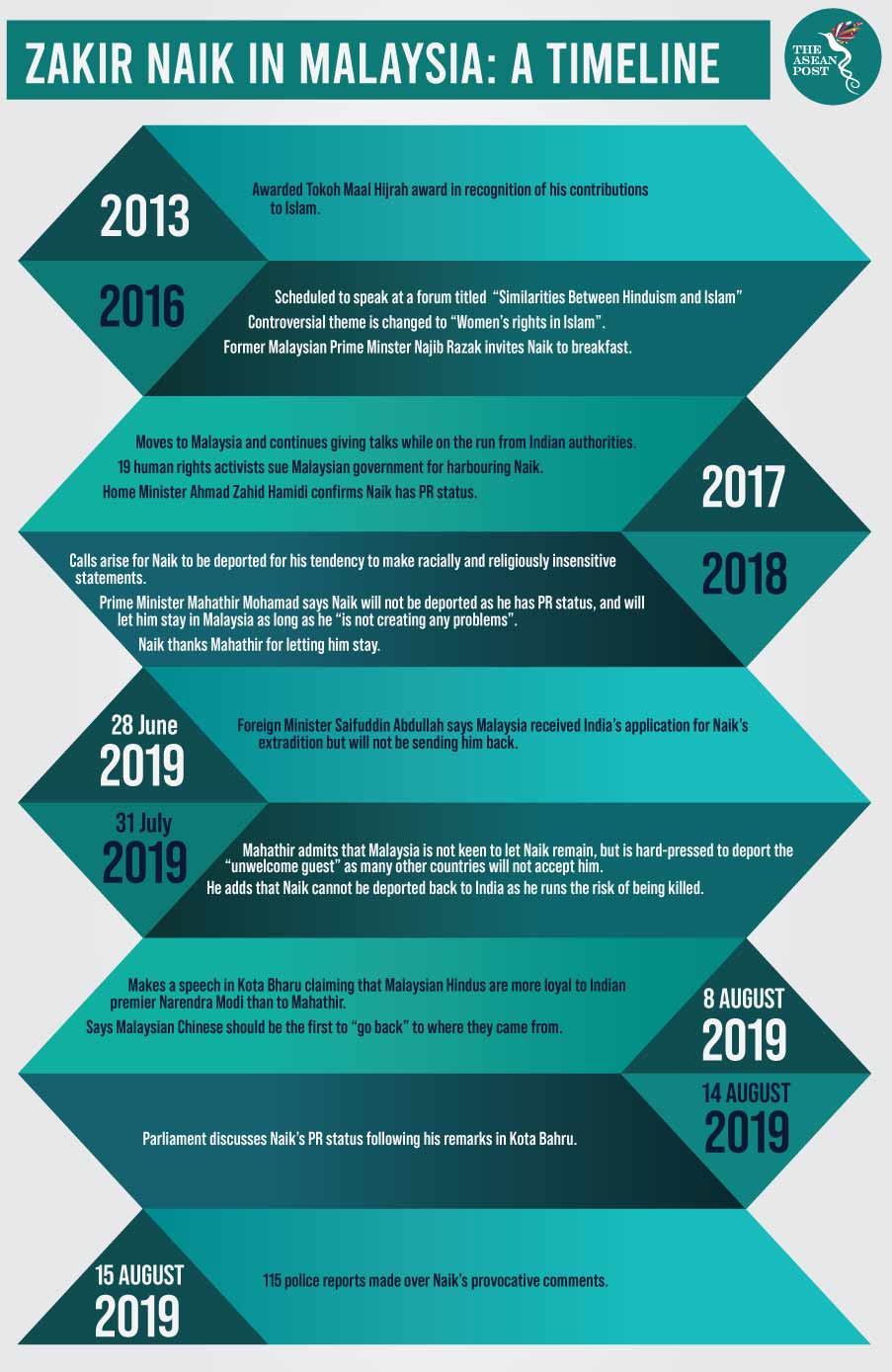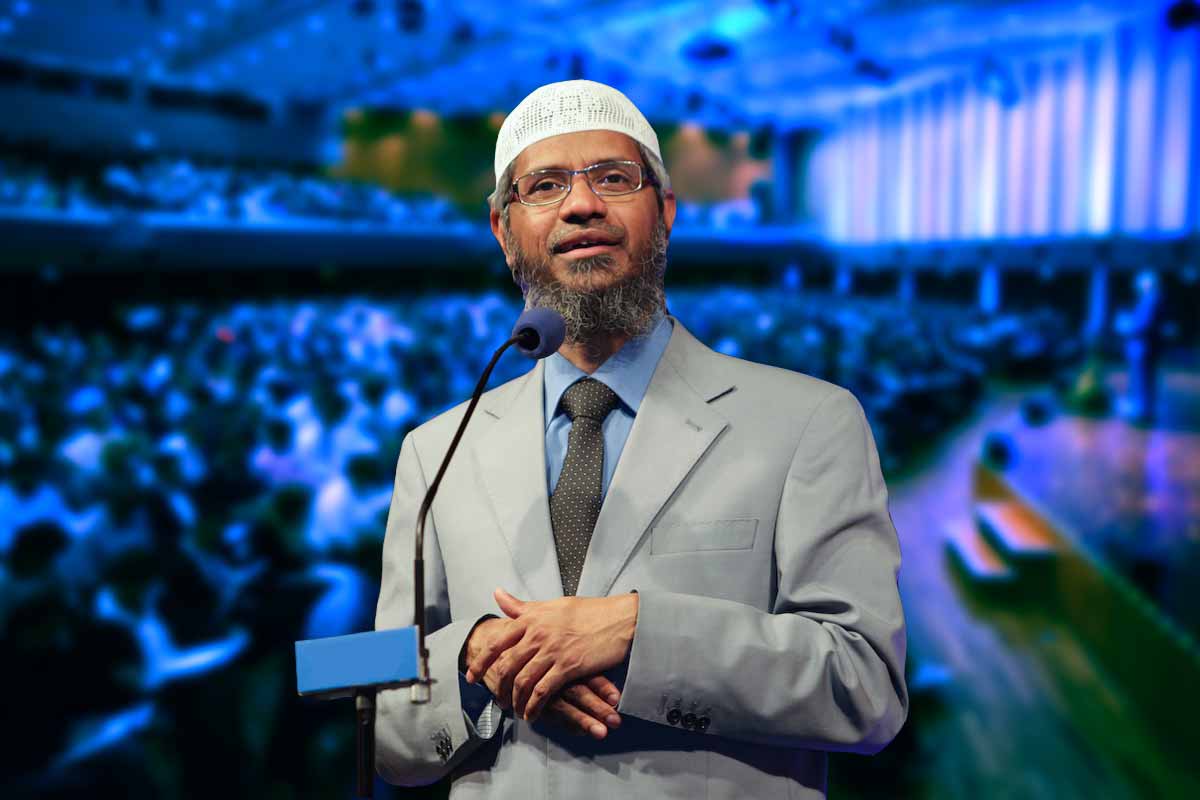Yesterday, The ASEAN Post published an article on Zakir Naik and the effect he has had on Malaysian society. That article left us with a glaring question: Why was the government of Malaysia so adamant in keeping Naik in the country before his controversial speech in the northern city of Kota Bharu in the state of Kelantan? This article seeks to find an answer to that question.
On 18 August 2019, an article written by local reporter Robin Augustin noted that while Naik and non-Muslim leaders have been engaged in a war of words, there had been “rare goodwill gestures” between Malaysia’s two rival Muslim factions, both of whom defended Naik in the wake of the media’s intense coverage of his recent speeches.
“One faction is that behind Perlis mufti Mohd Asri Zainul Abidin. He represents a brand of Islam that has sometimes defied Malaysia’s traditional Islamic practices. The other faction is that of the conservatives, which includes almost all other political figures, which represent mainstream Islam in Malaysia,” the article quoted an anonymous local observer of contemporary Malaysian Islamic movements.
The ASEAN Post also conducted its own interviews to find out if Naik could have been used as a tool to unite more than just Muslims of different schools of thought, in effect, making him valuable to the Malaysian government.
Nader Hashemi, director of the Center for Middle East Studies at the Josef Korbel School of International Studies, University of Denver, noted that Malaysia’s 14th general election (GE14) last year had cause somewhat of a rift between Malaysia’s majority race, the Malays.
“Some voted for the Pakatan Harpan (Coalition of Hope) alliance while others voted for Barisan Nasional (National Front). While Barisan Nasional lost the election, they still demonstrated strong support among the Malays. This suggests that during the next election they could return to power by invoking common populist themes,” Hashemi, whose expertise include comparative politics and political theory as well as democracy and human rights, told The ASEAN Post.
“Most politicians are interested in obtaining power and keeping power. They will do what is needed to obtain this goal. This often happens by playing the game of populist politics. It goes like this: A politician will claim that he will defend the rights of the majority against internal enemies and foreign threats who seek to subjugate them. Human rights and civil rights are ignored and the collective majoritarian rights are elevated.
“Fearmongering, xenophobia and cultivation of enemies (both foreign and domestic) is a key aspect of this form of politics. The truth is deliberately manipulated and the free press is attacked,” he said, adding that United States (US) President Donald Trump was a prototype of such a politician.

“In Malaysia, there are many similar examples. The politician personally benefits by rallying people around this narrative which propels him into power – but of course at the expense of democracy, national unity and human rights.”
Meanwhile, Associate Professor of Political Science at John Cabot University, Bridget Welsh, who is also an expert at Southeast Asian politics, told The ASEAN Post that she believed the Malays were split long before GE14.
“The Malays have always been split as the idea of 'Malay unity' is a myth. From the independence movement to the support of different Malay parties, division is the norm. What differed about GE14 is that the number of political choices for Malays increased and, importantly, the more liberal alternative captured more of the Malay vote,” she said.
Nevertheless, Welsh did agree that Malaysian politicians would view winning over at least a majority of Malays towards a single cause as a favourable outcome.
“Malays comprise the largest ethnic group so the more they win, the more political power these parties can gain. Together, (excluding Sarawak-based party United Bumiputera Heritage Party (Parti Pesaka Bumiputera Bersatu)) they can win a plurality but not a majority of seats. This allows the conservative, racialised and exclusionary religious agenda to gain traction.
“It is also important to keep in mind that Malaysia still holds onto the United Malays National Organisation (UMNO) legacy view that legitimacy comes from winning the majority of Malays - which accentuates the push toward mythical 'unity'.”
Jeffrey Kenney, professor of religious studies at DePauw University, however, brought up an interesting point: that it may be more strategic for Malaysian Prime Minister Dr Mahathir Mohamad and the ruling coalition, the Coalition of Hope (Pakatan Harapan) to maintain a division among the Malays.
“It is unlikely that a ‘majority’ would back some ‘liberal or progressive’ agenda. And it is not altogether clear what Mahathir actually wishes to see develop in the country… how committed he is to undoing some racial damage or ethnic antagonism he contributed to in the past,” he said.
“Perhaps this is where going after Naik enters the picture. Naik’s recent comments allow Mahathir –indeed all centrist politicians – to clearly identify themselves as “moderate” because Naik is so immoderate.”
How to use a preacher
When asked the question whether Naik could be used as a political tool to unite the Malays, both experts agreed, adding that they believed Naik has been used this way at least once in Malaysia.
“He is a political pawn originally in UMNO's (failed) effort to win religiously conservative Malay votes and to further push its racialised Malay nationalist agenda (targeting Indians as well as the Chinese),” Welsh said.
“As the two parties UMNO and PAS (Malaysian Islamic Party) have come together, Zakir has been a unifying tool of supposedly using a Muslim Indian foreigner for 'Malay unity' and 'defending Islam'. It is about maintaining the conservative Malay base.”
Kenney said the possibility of using Naik to unite the Malays was “certainly feasible.”
“And given the attention that this incident is getting in the media, with lots of politicians and public figures piling on, I’m sure some see it as a means of uniting Malays – all Malaysians – against immoderate racism,” he said.
Hashemi said using Naik as a political tool was already happening, but added that this would have grave effects on Malaysia’s future.
“Yes, he can be used in this way but the key question is to what end? If the goal is simply the naked grasp of power under a false sense of unity, then this is possible. I suspect it is already happening. If the goal, however, is a democratic Malaysia, rooted in Islamic ethics where everyone is equal before the law and key national groups have their rights respected and protected – then the politics of Zakir Naik should be firmly repudiated. It is this latter form of unity that really matters. The future of Malaysia depends on it.”
If Zakir Naik was indeed the hammer meant to unite the Malays, then did Malaysia inadvertently end up hitting its own fingers with the very same hammer? What do you think?
Related articles:
